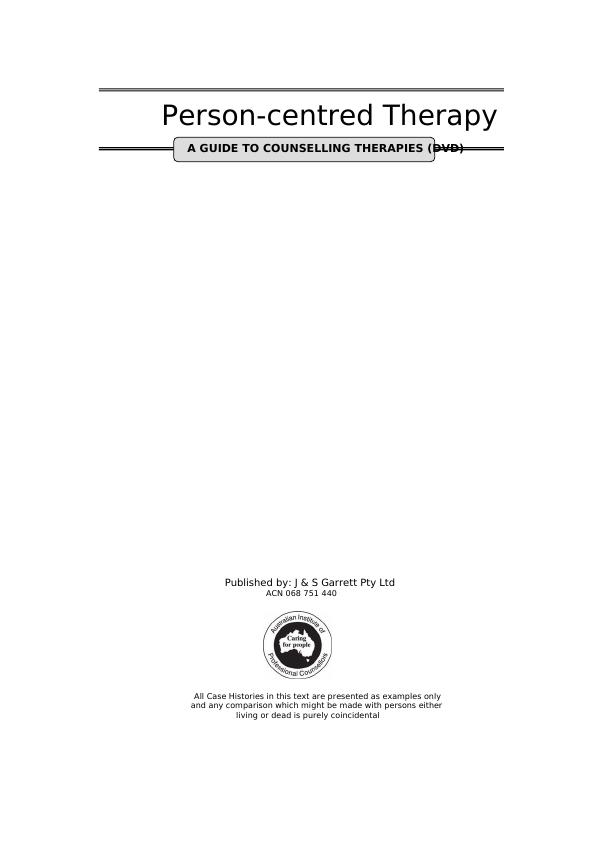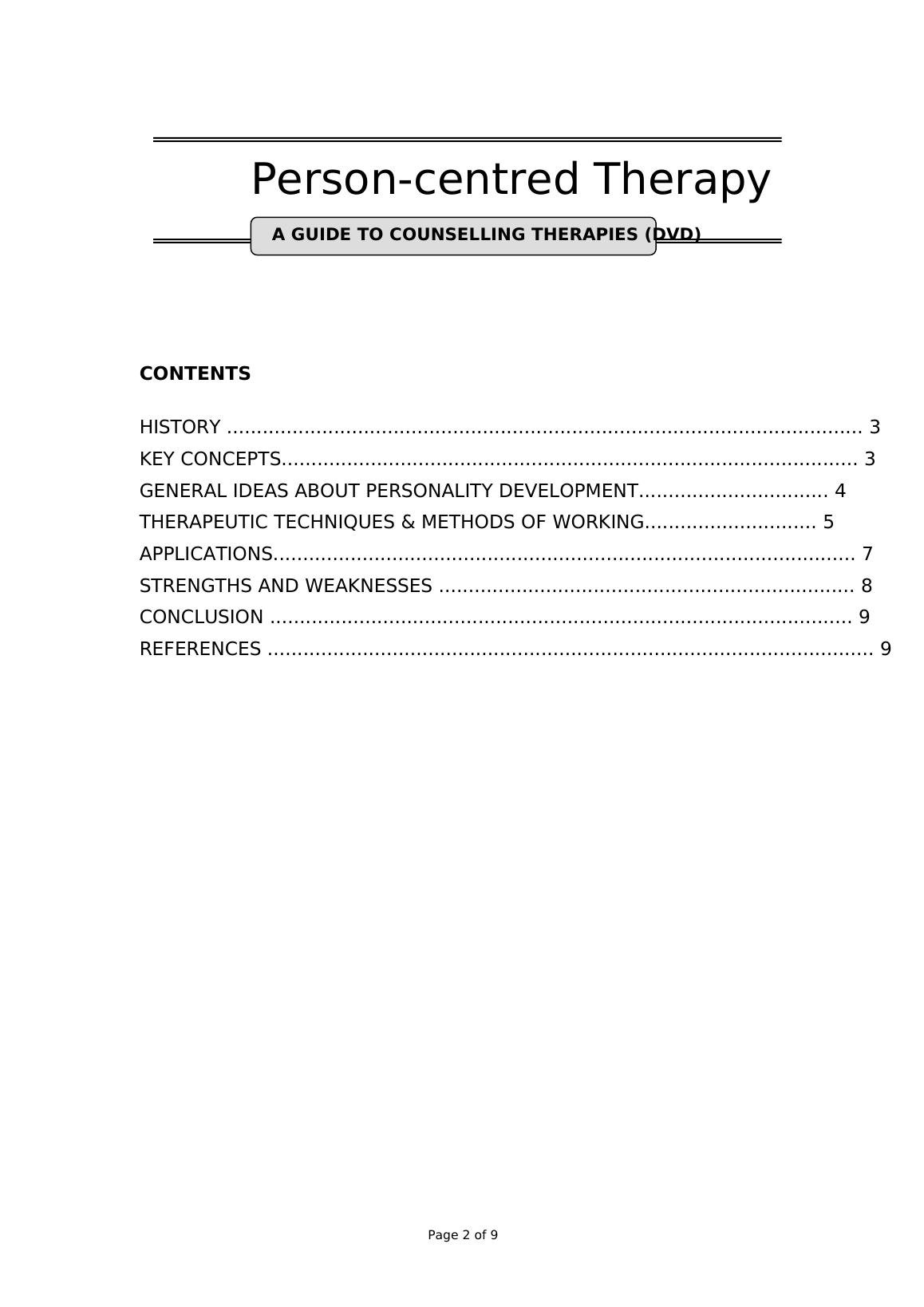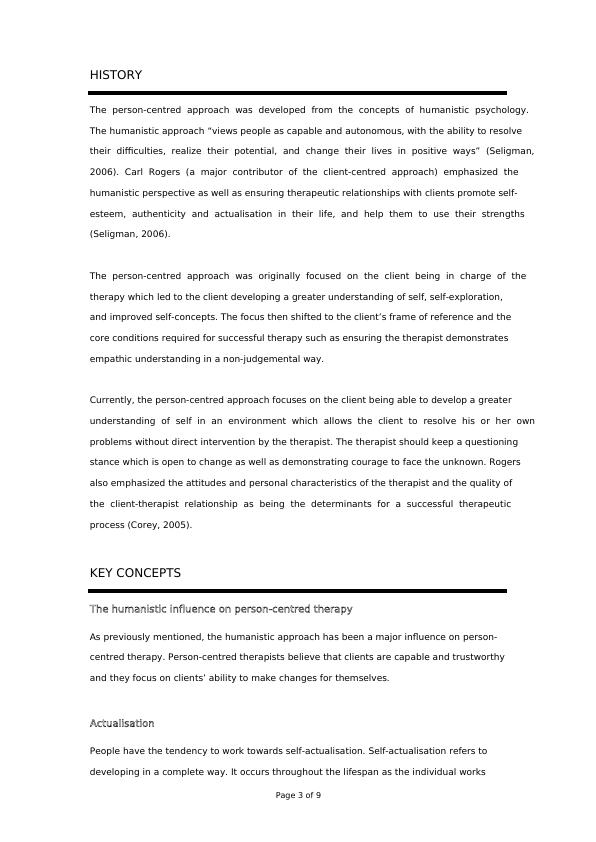General ideas about personality development PDF
Added on 2021-07-13
9 Pages2462 Words137 Views
A GUIDE TO COUNSELLING THERAPIES (DVD)Person-centred Therapy Published by: J & S Garrett Pty Ltd ACN 068 751 440 All Case Histories in this text are presented as examples only and any comparison which might be made with persons either living or dead is purely coincidental

Page 2 of 9 A GUIDE TO COUNSELLING THERAPIES (DVD)Person-centred Therapy CONTENTS HISTORY ........................................................................................................... 3KEY CONCEPTS................................................................................................. 3GENERAL IDEAS ABOUT PERSONALITY DEVELOPMENT................................ 4THERAPEUTIC TECHNIQUES & METHODS OF WORKING............................. 5APPLICATIONS.................................................................................................. 7STRENGTHS AND WEAKNESSES ...................................................................... 8CONCLUSION .................................................................................................. 9REFERENCES ...................................................................................................... 9

Page 3 of 9 HISTORY The person-centred approach was developed from the concepts of humanistic psychology. The humanistic approach “views people as capable and autonomous, with the ability to resolve their difficulties, realize their potential, and change their lives in positive ways” (Seligman, 2006). Carl Rogers (a major contributor of the client-centred approach) emphasized the humanistic perspective as well as ensuring therapeutic relationships with clients promote self-esteem, authenticity and actualisation in their life, and help them to use their strengths (Seligman, 2006). The person-centred approach was originally focused on the client being in charge of the therapy which led to the client developing a greater understanding of self, self-exploration, and improved self-concepts. The focus then shifted to the client’s frame of reference and the core conditions required for successful therapy such as ensuring the therapist demonstrates empathic understanding in a non-judgemental way. Currently, the person-centred approach focuses on the client being able to develop a greater understanding of self in an environment which allows the client to resolve his or her own problems without direct intervention by the therapist. The therapist should keep a questioning stance which is open to change as well as demonstrating courage to face the unknown. Rogers also emphasized the attitudes and personal characteristics of the therapist and the quality of the client-therapist relationship as being the determinants for a successful therapeutic process (Corey, 2005). KEY CONCEPTS The humanistic influence on person-centred therapy As previously mentioned, the humanistic approach has been a major influence on person-centred therapy. Person-centred therapists believe that clients are capable and trustworthy and they focus on clients’ ability to make changes for themselves. Actualisation People have the tendency to work towards self-actualisation. Self-actualisation refers to developing in a complete way. It occurs throughout the lifespan as the individual works

End of preview
Want to access all the pages? Upload your documents or become a member.
Related Documents
Person Centred Theorylg...
|5
|1097
|342
Theory of Counseling and Psychotherapylg...
|15
|4430
|348
Person-Centred Approach to Counsellinglg...
|7
|966
|376
Contemporary Humanistic Counselling Theorylg...
|7
|1923
|476
Psychology Personal Development activitieslg...
|7
|1631
|10
Theories of Counseling: Person-Centered Care and Cognitive Behavioral Therapylg...
|12
|3228
|184
